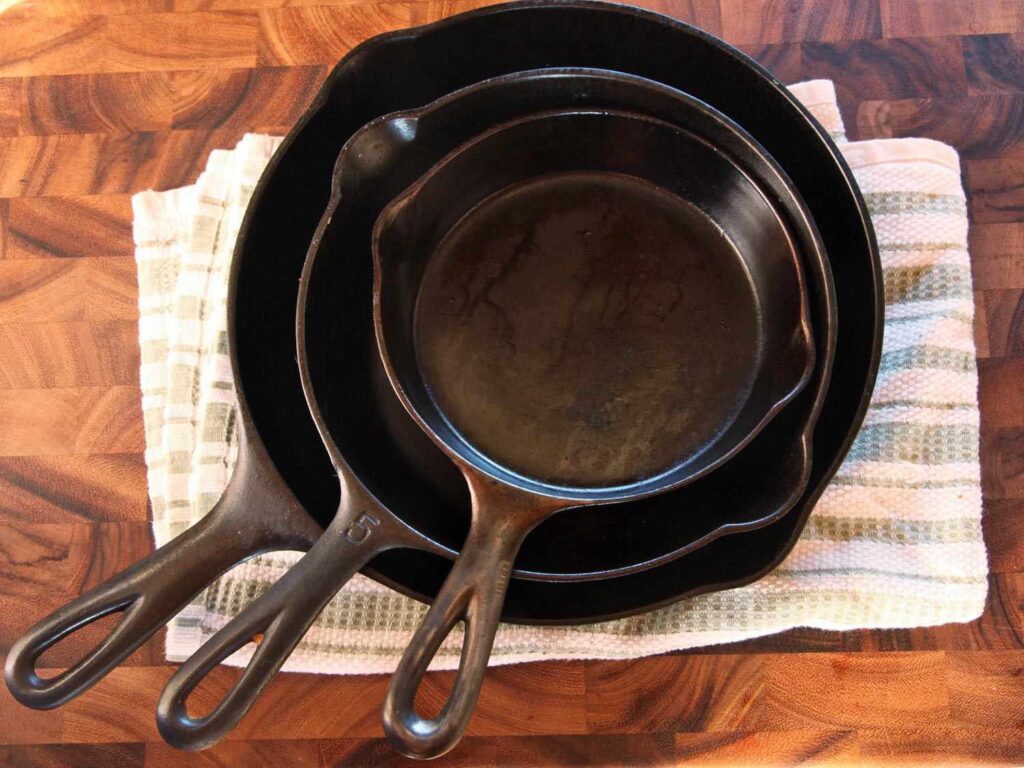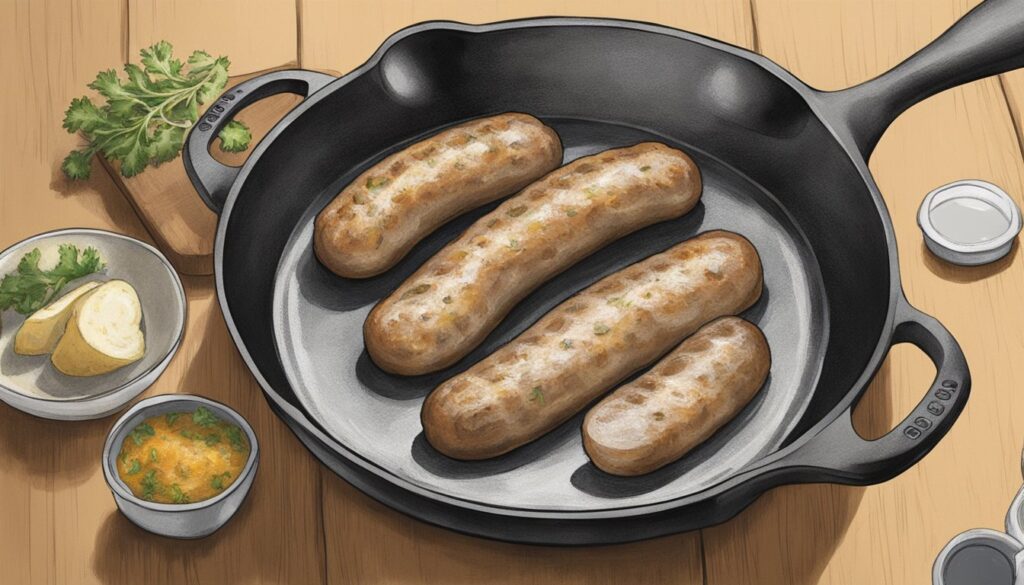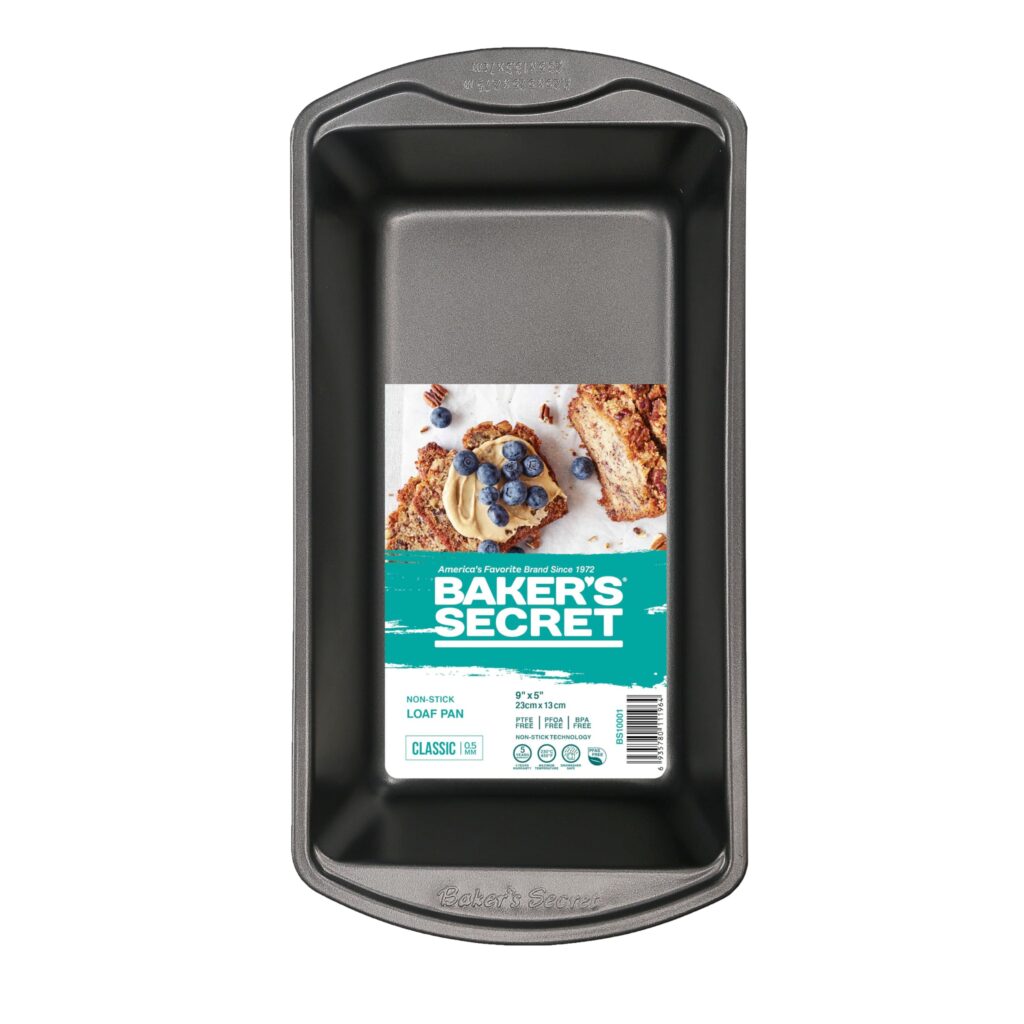No, you should not put a cast iron skillet in the dishwasher. The dishwasher can ruin its seasoning and cause rust.
Cast iron skillets are prized for their durability and excellent heat retention, making them a favorite in many kitchens. Proper care is essential to maintain their non-stick surface and longevity. Washing cast iron in the dishwasher can strip the skillet of its seasoning, which is the protective layer that prevents food from sticking and rust from forming.
Instead, hand wash with warm water and a brush, then dry thoroughly. Apply a thin layer of oil to the skillet to preserve its seasoning. By avoiding the dishwasher, you can ensure your cast iron skillet remains in optimal condition for many years of cooking.
Table of Contents
ToggleThe Cast Iron Skillet: A Culinary Staple
The cast iron skillet has been a cornerstone in kitchens for centuries. Its versatility and durability make it an invaluable tool. Whether you are searing, baking, or frying, a cast iron skillet delivers exceptional results.
Historical Significance
Cast iron cookware dates back to ancient China. It gained popularity in Europe during the 16th century. By the 18th century, American households widely used cast iron skillets. Their long-lasting nature made them a family heirloom.
Cast iron skillets have stood the test of time. They have been essential for pioneers on the frontier. They were versatile for cooking over open flames and hearths.
Why It’s Beloved By Chefs
Chefs around the world swear by cast iron skillets. One key reason is heat retention. Cast iron evenly distributes heat, ensuring perfectly cooked dishes.
Cast iron skillets also provide a natural non-stick surface. This improves with use and proper seasoning. This makes them ideal for tasks like frying eggs or flipping pancakes.
The durability of cast iron is unmatched. A well-maintained skillet can last generations. This makes it a sustainable choice for professional kitchens.
| Benefits | Details |
|---|---|
| Heat Retention | Keeps food warm longer |
| Versatility | Can be used on various heat sources |
| Durability | Lasts for generations with proper care |
| Non-Stick Surface | Improves with seasoning |
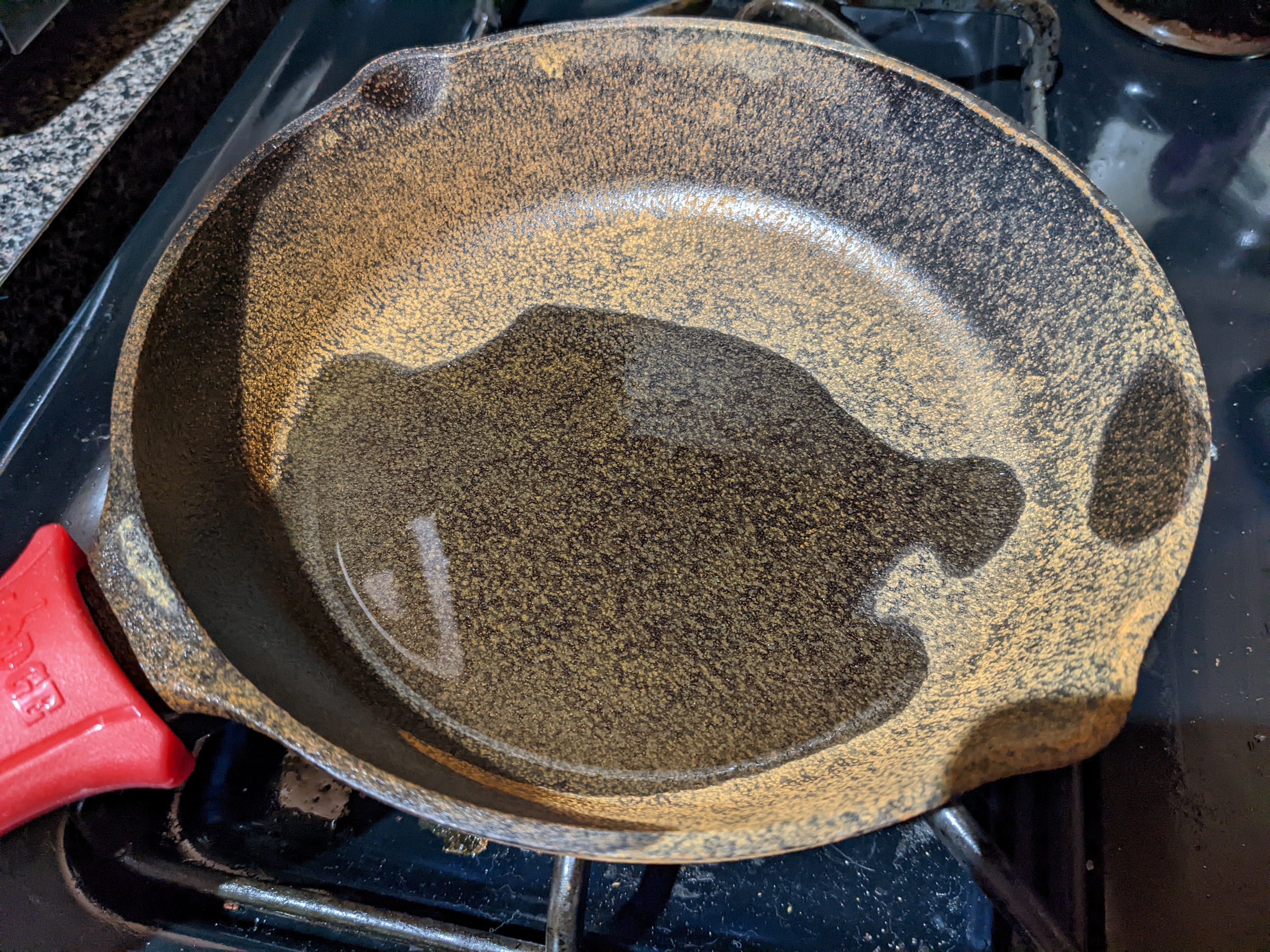
Credit: foodisstupid.substack.com
Common Myths Around Cast Iron Care
Many people believe certain myths about cast iron care. These myths can lead to improper maintenance. Let’s debunk some common misconceptions.
The Soap Debate
One common myth is that you should never use soap on cast iron. This is not true. Soap can be used to clean cast iron skillets. Modern dish soaps are gentle and will not strip the seasoning.
After using soap, rinse the skillet well. Then, dry it completely. This ensures no moisture remains. Always reapply a thin layer of oil to maintain the seasoning.
- Use mild dish soap.
- Rinse thoroughly.
- Dry completely.
- Reapply oil.
Rust Fears
Another myth is that cast iron rusts easily. Cast iron can rust, but it is preventable. Proper care keeps rust at bay.
After washing, always dry the skillet immediately. Use a paper towel or low heat on the stove. Apply a thin layer of oil to create a protective barrier.
| Step | Action |
|---|---|
| 1 | Wash and rinse the skillet. |
| 2 | Dry it completely using a paper towel or heat. |
| 3 | Apply a thin layer of oil. |
Following these steps helps prevent rust. Proper care ensures your skillet lasts for generations.
Dishwashers And Cast Iron: The Great Debate
Can you put a cast iron skillet in the dishwasher? This question has sparked many debates. Some believe it’s convenient. Others argue it can ruin your skillet.
The Impact Of Dishwashing
Dishwashers use hot water and strong detergents. These can strip the seasoning off your cast iron skillet. Seasoning is the protective layer that prevents rust and adds flavor. Without seasoning, the skillet can rust and lose its non-stick quality.
Dishwashers also expose the skillet to water for a long time. Prolonged exposure to water can lead to rusting. Rust weakens the skillet and makes it less effective.
Expert Opinions
Many experts advise against washing cast iron in dishwashers. Chef John from Food Network says, “Always hand wash your cast iron.” He believes dishwashers are too harsh.
Another expert, Chef Lisa, notes, “Hand washing preserves the skillet’s seasoning.” She recommends using a soft brush and mild soap.
Here is a table summarizing the experts’ opinions:
| Expert | Recommendation |
|---|---|
| Chef John | Hand wash only |
| Chef Lisa | Use soft brush and mild soap |
To keep your cast iron skillet in top shape, follow these steps:
- Rinse with hot water after use.
- Scrub gently with a brush.
- Dry thoroughly to prevent rust.
- Apply a thin layer of oil to maintain seasoning.
Taking care of your cast iron skillet ensures it lasts for generations.
Credit: www.reddit.com
The Science Of Seasoning
The Science of Seasoning a cast iron skillet is fascinating. Seasoning creates a non-stick layer, protecting the skillet from rust. This process involves heating oil to form a durable coating. Understanding this process helps maintain your skillet’s quality and functionality.
How Seasoning Works
Seasoning starts with oil. You apply a thin layer to the skillet. When heated, the oil undergoes a reaction called polymerization. It transforms into a hard, plastic-like coating. This layer bonds with the skillet’s surface. The result is a smooth, non-stick finish. This finish also acts as a protective barrier against moisture and rust.
Dishwashing’s Effect On Seasoning
Dishwashers are harsh on cast iron skillets. They use high heat and strong detergents. These conditions strip away the seasoning layer. The result is a skillet that is no longer non-stick. Worse, it becomes prone to rust.
Here are the main effects of dishwashing on seasoning:
- High heat breaks down the seasoning.
- Detergents dissolve the protective oil layer.
- Water exposure leads to rust formation.
To maintain your skillet, avoid the dishwasher. Hand wash with mild soap and dry immediately. Reapply oil to keep the seasoning intact.
Real Experiences: Cast Iron In The Dishwasher
Many people wonder about putting their cast iron skillets in the dishwasher. Some have tried it, and their stories can help us understand the real outcomes. Let’s explore their experiences.
Testimonials
Several home cooks shared their experiences with cast iron skillets in the dishwasher:
- John: “I put my skillet in the dishwasher once. It came out rusty.”
- Susan: “The dishwasher ruined the seasoning on my skillet.”
- Mike: “My skillet lost its non-stick surface after one wash.”
- Emma: “I had to re-season my skillet after a dishwasher cycle.”
Surprising Outcomes
Some users experienced unexpected results:
| User | Outcome |
|---|---|
| Alice | The skillet turned orange from rust. |
| Bob | The dishwasher left white spots on the skillet. |
| Charlie | The skillet’s handle became loose. |
| David | The seasoning flaked off completely. |
These experiences highlight the potential risks of using a dishwasher for cast iron skillets. The consensus is clear: avoid the dishwasher for your cast iron cookware.

Credit: www.reddit.com
Care And Maintenance Tips
Proper care and maintenance of your cast iron skillet are essential for its longevity. With the right techniques, you can ensure your skillet stays in excellent condition. Below are some tips to help you maintain your cast iron skillet effectively.
Proper Cleaning Techniques
Cleaning your cast iron skillet involves simple steps to keep it in good shape:
- Do not put it in the dishwasher. The dishwasher can cause rust and damage.
- Hand-wash with warm water and a small amount of soap.
- Avoid soaking the skillet in water for long periods.
- Use a scrub brush or sponge to remove stuck-on food.
- Dry it thoroughly with a towel immediately after washing.
For stubborn residue, try using a paste of coarse salt and water. Scrub the skillet with this paste to remove the residue without damaging the seasoning.
Seasoning Best Practices
Seasoning your cast iron skillet creates a natural, non-stick surface. Follow these steps for best results:
- Preheat your oven to 375°F (190°C).
- Apply a thin layer of vegetable oil or shortening to the skillet.
- Place the skillet upside down on the oven’s middle rack.
- Put a sheet of aluminum foil on the bottom rack to catch drips.
- Bake for one hour, then turn off the oven and let the skillet cool inside.
Repeat this process every few months to maintain the seasoning. With regular care, your cast iron skillet will remain a versatile and durable kitchen tool.
Alternatives To Dishwashing
Using a dishwasher to clean a cast iron skillet can damage it. It’s essential to explore alternatives to dishwashing that keep your skillet in pristine condition.
Manual Cleaning Methods
Manual cleaning preserves the quality of your cast iron skillet. Here are some methods:
- Warm Water and Scrub: Use warm water and a scrub brush to clean.
- Salt Scrub: Sprinkle coarse salt and scrub to remove food particles.
- Boiling Water: Boil water in the skillet to loosen stubborn bits.
After cleaning, dry the skillet thoroughly to prevent rust. Apply a light coat of oil to maintain the seasoning.
Innovative Cleaning Tools
Several tools can simplify cleaning your cast iron skillet:
| Tool | Purpose |
|---|---|
| Chainmail Scrubber | Efficiently removes stuck-on food without damaging the seasoning. |
| Silicone Scrapers | Scrapes off food remnants while being gentle on the skillet. |
| Cast Iron Brush | Designed specifically for cleaning cast iron surfaces. |
Using these tools can make the cleaning process quicker and more effective.
The Verdict: To Dishwash Or Not?
Cast iron skillets are beloved for their durability and cooking performance. But, can you put a cast iron skillet in the dishwasher? This question has sparked many debates among home cooks and professional chefs alike. Let’s delve into the details to find out the best way to care for your cast iron skillet.
Weighing The Pros And Cons
| Pros | Cons |
|---|---|
|
|
Convenience is the main advantage of using a dishwasher. You save time and effort by letting the machine do the work. But the cons outweigh the pros. The dishwasher can strip the skillet’s seasoning, which is essential for its non-stick properties. It also increases the risk of rust and can shorten the skillet’s lifespan.
Final Recommendations
To keep your cast iron skillet in top condition, avoid the dishwasher. Instead, follow these simple steps for cleaning:
- Hand wash with warm water and a soft sponge.
- Use a small amount of mild soap if needed.
- Dry thoroughly with a clean towel.
- Apply a thin layer of vegetable oil to the surface.
- Store in a dry place to prevent rust.
By following these steps, your cast iron skillet will stay in excellent shape for years. Happy cooking!
Frequently Asked Questions
Can You Wash Cast Iron In The Dishwasher?
No, you should not wash cast iron in the dishwasher. The dishwasher can strip the seasoning from the skillet. It can also cause rusting.
Why Is Dishwasher Bad For Cast Iron?
The dishwasher uses harsh detergents and high heat. These can damage the cast iron’s seasoning and cause rust.
How To Clean A Cast Iron Skillet?
Clean cast iron with warm water and a stiff brush. Avoid using soap. Dry it thoroughly after washing to prevent rust.
Can Dishwasher Soap Damage Cast Iron?
Yes, dishwasher soap can damage cast iron. It strips the skillet’s seasoning and can lead to rust formation.
Conclusion
Avoid placing your cast iron skillet in the dishwasher. Hand washing preserves its seasoning and longevity. Dishwashers can strip the protective layer, leading to rust. Keep your skillet in top shape by cleaning it properly. Your meals will taste better, and your skillet will last for years.
Proper care ensures optimal performance.

Hi, I’m Kimberley. I am a happy and adventurous person who enjoys writing about the finer details of the kitchen niche. My blog is where I can share all my thoughts and opinions with other passionate food lovers like me!
if you’re reading this then it’s probably safe to assume that you’ve stumbled across one of my blogs about the kitchen niche! I love writing informative blogs and review posts for those who are looking for a little bit more information before buying their next product.
Follow me on Twitter

